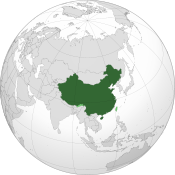'Statues of Democracy' removed in Hong Kong
Sunday, May 30, 2010

Image: Wrightbus.
Two sculptures have been confiscated and thirteen pro-democracy activists arrested in Hong Kong, in what critics have described as "politically motivated" censorship.
The sculptures, a new replica of the "Goddess of Democracy" and a carving called the "Tiananmen Massacre Relief", had been placed in the piazza of Hong Kong's Times Square shopping mall in remembrance of the 21st anniversary of the Tiananmen Square Incident.
Although the Causeway Bay piazza is designated as a public space, its day-to-day operations are run by the shopping mall's management. They made a complaint that the Hong Kong Alliance in Support of Patriotic Democratic Movements in China, or the "Alliance" for short, had failed to ask permission for their activities.
When police and officials from the Food and Environmental Hygiene Department attempted to remove the sculptures on the grounds for obstructing public access, they were prevented from doing so by activists for two hours. The police made 13 arrests, including that of a legislator for preventing the police from carrying out their duties. The statue was removed and is currently in the custody of the Customs and Excise department (C&ED). The 13 persons arrested were released on bail the same day.
Alliance secretary Albert Ho claimed that as Times Square was a public area, the police had no right to stop them, that similar activities had been held before, and that he had "...never been treated so barbarically and so violently...".
Alliance vice-chairman Lee Cheuk-yan said that C&ED's action was unusual, and that he has contacted the department to find out if the department was trying to censor materials related to the Tiananmen Square incident.
As part of its Basic Law, Hong Kong continues to enjoy western-style liberties within the One country, two systems settlement within China. In the past political activities that are taboo in China proper have been tolerated by the Special Administrative Region of the People's Republic of China (SAR) authorities.
Sources
- "Police release democratic activists" — RTHK, May 30, 2010
- Min Lee. "Hong Kong police confiscate Tiananmen statue" — Associated Press, May 29, 2010
- "香港沒收六四展覽品 扣押13人" — BBC, May 29, 2010 (Chinese)
- "海關扣起支聯會六四雕塑" — Ming Pao, May 29, 2010 (Chinese)}
- "何俊仁指當局打壓悼念六四活動" — Sing Tao Daily, May 29, 2010(Chinese)



